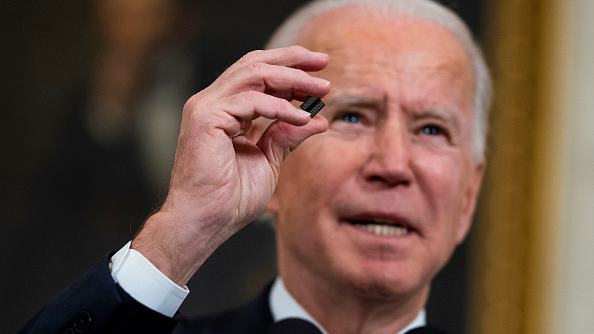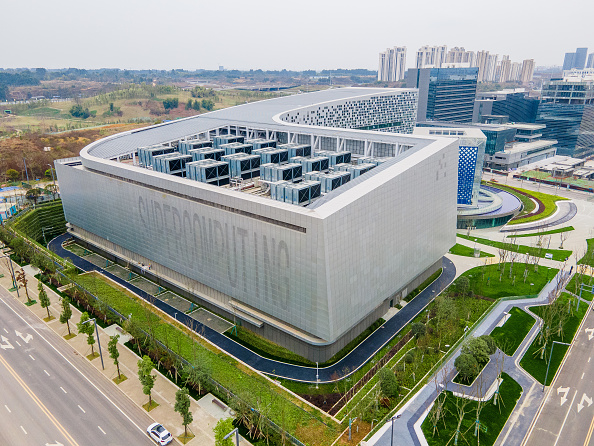
U.S. President Joe Biden holds a semiconductor during his remarks before signing an Executive Order on the economy in the State Dining Room of the White House in Washington, DC., U.S., February 24, 2021. /Getty
U.S. President Joe Biden holds a semiconductor during his remarks before signing an Executive Order on the economy in the State Dining Room of the White House in Washington, DC., U.S., February 24, 2021. /Getty
Editor's note: Keith Lamb is a University of Oxford graduate with an MSc degree in Contemporary Chinese Studies. His primary research interests are China's international relations and "socialism with Chinese characteristics." The article reflects the author's opinions and not necessarily the views of CGTN.
Controlling the heights of technology has been the "secret sauce" of U.S. hegemony. Being at the top of the technological food chain imbues the U.S. with military superiority and economic power. Surplus can be extracted from IP rents, and the creation of technological standards shapes the future, requiring others to jump to its tune. Furthermore, the Global South, left with outdated technology, remains stuck with producing low value-added goods.
Instead, in an equitable world, innovation comes from the entire planet. The Global South, with the majority of the people, shouldn't be subjugated by a minority. If the moral argument doesn't persuade, then consider the pragmatic reasons for bringing more of humanity into the innovation game. Firstly, the technological strides that humanity could make together would be incredible. Secondly, they are necessary for solving our shared environmental predicament. Thirdly, this realizes the valuable, but overlooked, resource of humanity itself, imbued with the nature to create.
However, to turn this dream into reality, the world needs to be allowed to catch up. Unfortunately, transnational liberal class interests, who control the U.S., seek to maintain the status-quo of technological inequality which augments their hegemony. Technological equality which would lead to a preferable world for all, including themselves, will due to zero-sum power calculations be resisted. Simply put, they would rather reign over hell than serve in heaven.
This is why semiconductor chips, the indispensable pillar of all modern technology, is the focus of the U.S.-tech war on China. By denying China access to this technology, which will only become more important as the Internet of Things becomes a reality, the U.S. seeks to curb China's rise and maintain its technological rental privileges.
The assault on China's development started with denying chips to Huawei over spying concerns. However, history has proved this excuse to be smoke and mirrors as a myriad of Chinese technologies are now subject to semiconductor sanctions. In December 2020, Chinese chip manufacturer SMIC was blacklisted, and in April 2021, seven Chinese supercomputing organizations were put on the U.S. Entity List to scrutinize their technology purchases.
This was done under the pretext that supercomputing can be used for designing weapons and thus threaten U.S. interests. It is, in fact, true that technology does crossover to military fields. For example, the chip industry grew up in tandem with U.S. rocket development. However, the implications, of this reasoning, is that no country, out of fear of military crossover, will be allowed to develop domestic technology because this has the potential to challenge U.S. interests, which, being hegemonic, seek to dominate all.

Chengdu Supercomputing Center, which was completed and put into operation in 2020, Chengdu, southwest China's Sichuan Province, March 2, 2021. /Getty
Chengdu Supercomputing Center, which was completed and put into operation in 2020, Chengdu, southwest China's Sichuan Province, March 2, 2021. /Getty
Consider the case that while supercomputing can be used for weapons design, it can also be used for genome and weather mapping, as well as working on models that can help combat climate change. Consequently, denying this technology to others is immoral.
Coming back to the assertion of this analysis that technological dominance provides U.S. "liberal capital" an important tool for maintaining its privilege in both the economic and military realms, and that the ubiquitous semiconductor will be in every modern-day product, from electric cars to even clothing, we can expect just about any company, both Chinese and foreign, to face U.S. restrictions if these restrictions are deemed expedient for maintaining their hegemony.
For example, Taiwanese chipmaker TSMC has been forced to comply with U.S. sanctions by restricting exports of chips using U.S. technology to the Chinese mainland; Dutch firm ASML, which makes chipmaking machines, has also been compelled to follow suit; and Samsung, along with others, has been forced to hand over their chip supply data to the U.S. Furthermore, the U.S. is seeking to transfer the semiconductor industry out of Asia to the U.S. itself.
By missing out on the Chinese market, these firms lose the necessary R&D capital needed for staying on the technological cutting-edge, while their supply chain data allows the U.S. to buttress its own companies. Conversely, U.S. chip manufacturers, complaining of declining profits, have been granted limited permission to export technology to Huawei and SMIC. This exposes a pragmatic double standard that exists in service of U.S. capitalists who seeks to balance their profits by maintaining technological supremacy at the cost of others.
Indeed, this contradiction highlights why the U.S. and China worked together in the first place. China wanted to develop its technological base, for the purpose of national rejuvenation and socialist construction, while the U.S. wanted to access China's consumer and labor markets to buttress capitalism. This contradiction may well reappear! Through U.S. domination of foreign manufacturers, there may be temporary gains, however declining profits, due to decoupling, may remind the U.S. of why they originally coveted the Chinese market.
Of course, a more terrifying prospect is that the U.S., by taking actions, such as transferring the semiconductor industry within its borders, is setting its pieces up so that it can enforce technological inequality over Asia through military means. As insane as this sounds, such actions wouldn't be unprecedented and the rents collected from war might be enough to compensate those who wish to "reign over hell."
(If you want to contribute and have specific expertise, please contact us at opinions@cgtn.com.)

